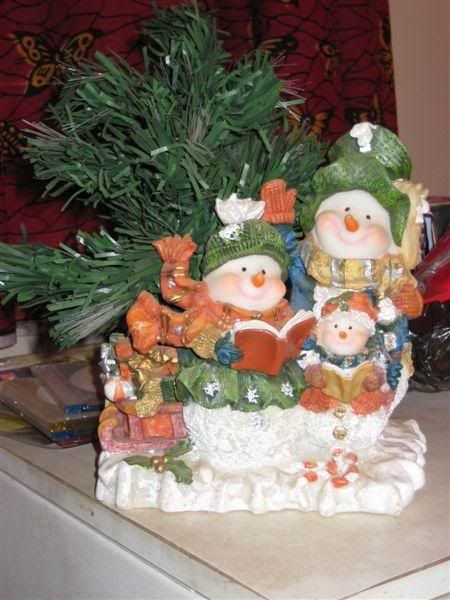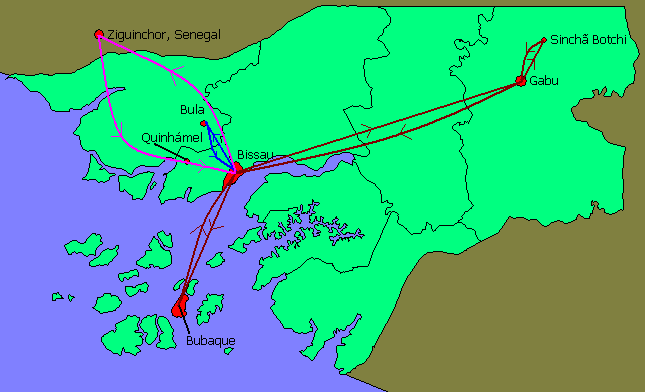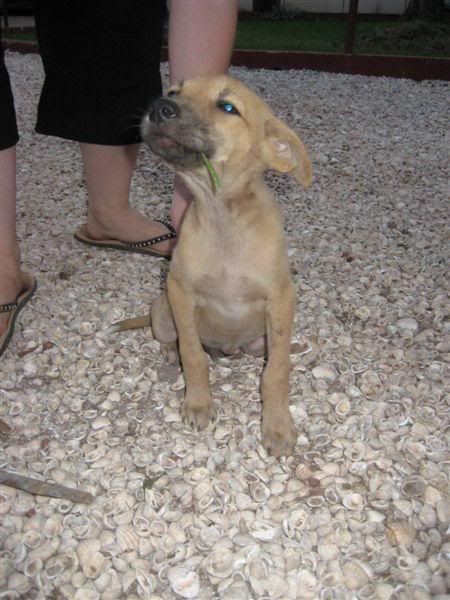Here in Guinea-Bissau no one really talks about Christmas until around the 20th. It was a little depressing last year, so this year Jase and I have been doing Christmas in a more American way. I made pumpkin pie for my classes on Thanksgiving and then the next day I got some white, red, and green ribbons and decorated all of the classrooms. On the Saturday after we had a big Thanksgiving dinner with us, Erica, Jens (a missionary from Germany), and two of the guys who work at the center, Tolos and Jerry. Since then I have been playing Christmas music a lot. I decorated our room and put a few things up in the kitchen here. I took a few pictures, so I thought I would share them with you guys.

This is our little tree in our room. Jason's Aunt Chris sent it over to us last year. The coolest feature you can't see right now. It lights up with little fiber optic lights that glow red and green. 
This is the tree in our kitchen
Speaking of Christmas, Jason and I have been trying to make plans of fun stuff to do on our break. Jason doesn't have any classes in December, and I finish with classes on December 14th. We both start back on January 7th, so we have a few weeks to do stuff. If we can do everything that we want to do we will get to see quite a bit of Guinea-Bissau that we have not seen before.
On the first week that we both have off I think that we are going to go up to Ziguinchor (in Senegal) for a few days. It is a little bit of a tourist town, so it should be a nice vacation for us. After that we would like to go to Quinhámel which is a little village that's not far from us. We can take some nice walks there and I really want to go see a cool weaving factory that has been built there.
From the 20th to the 23rd we have a staff retreat for all of the people who work here at the Youth Center. We are going to a little town called Bula to play sports, have some discipleship time, and even hang out around the campfire. It should be really fun.
On the 24th Jase and I are going to go up to Sinchã Botchi to spend Christmas with our friends from Brazil, Gilson, Rosania, and their little 4 year old girl Nicole. She is very energetic and outgoing, so we have a lot of fun with her. We are going to stay there until the 27th. On the 27th the five of us are going to come back to Bissau, spend the night here, and then get on a ship to Bubaque. Bubaque is one of the islands of Guinea-Bissau. They have really nice beaches and the pastor of the evangelical church there has a guest house that we can stay in.
Here is a map of the places we will be going. All of the green is Guinea-Bissau and the thin black lines separate the different regions. I made all of the cities that we are going to into red dots. The pink route is the first trip that just Jason and I are taking. The blue one is the whole staff of the Youth Center going to our retreat. The dark red one is our Christmas and island trip with Gilson and Rosania. I know it's a little silly, but I had a good time making it  .
. 
I will let you know how all of this goes. I want to hear all about your Christmas fun times too 
Oh, yeah, a few random things with pictures for your enjoyment...
Our guard dog likes to walk around with grass sticking out of his mouth, so we are pretty sure he is Arkansan at heart 
Some of our good friends here had a baby recently. Their names are Pastor Beto and Ligia and the baby is Manaseis (not sure about the spelling). We went to see him when he was just two weeks old. Aparently Guinean babies are born with much lighter skin and then they get darker over the first month. Kind of like how most white babies are born with blue eyes and then the color changes after a week or so.
The new family
Me with the little guy 





